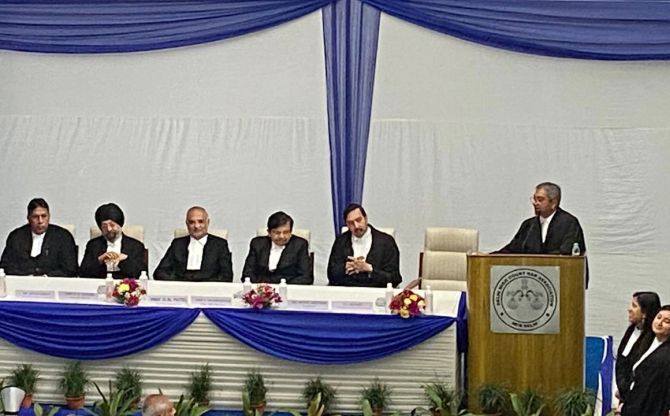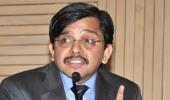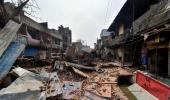Justice S Muralidhar on Thursday cleared the air over the controversy on his transfer from the Delhi high court to Punjab and Haryana high court, saying he had replied to Chief Justice of India S A Bobde's communication that he was fine with the proposal and had no objection.

The controversy erupted after the Centre issued Justice Muralidhar's transfer notification close to mid night of February 26 -- the day a bench headed by him had pulled up Delhi Police for failing to register FIRs against three Bharatiya Janata Party leaders for their alleged hate speeches which purportedly led to the recent violence in northeast Delhi.
Justice Muralidhar (58), who received a grand farewell on Thursday from a huge gathering including judges and lawyers amid a big round of applause, said he wanted to clear the confusion on his transfer and narrated the sequence of events from the time he received CJI's communication till February 26.
The Supreme Court collegium, headed by the CJI, had in a meeting on February 12 recommended the transfer of Justice Muralidhar to Punjab and Haryana high court.
Justice Muralidhar was number three in the Delhi high court, his parent high court as a judge.
Explaining the transfer process, he said the 5-member collegium sends to the Centre a recommendation that a judge of a high court should be transferred to another high court. The judge concerned is not at this stage under orders of transfers. That happens only when the collegium's recommendation fructifies into a notification.
"In my case, the collegium's decision was communicated to me by the CJI on February 17 by a letter which sought my response. I acknowledged receipt of the letter, I was then asked to clarify what I meant. As I saw it, if I was to be transferred from the Delhi high court any way, I was fine with moving to the Punjab and Haryana high court.
"I therefore clarified to the CJI that I did not object to the proposal. An explanation for my transfer reached the press...on February 20 quoting 'sources in the Supreme Court collegium', confirming what has been indicated to me a couple of days earlier," he said.

The CJI's letter dated February 14 was delivered to Justice Muralidhar on February 17, the day when the family's pet labrador Sakhi breathed her last.
He said February 26 was perhaps the longest working day of his life as a judge of the Delhi high court, where he has spent 14 years on the bench.
He said it began at 12:30 am with a sitting at his residence with Justice A J Bhambhani, under the orders of Justice G S Sistani, to deal with a PIL filed by Rahul Roy seeking safe passage of ambulances carrying the injured riot victims.
"When I received a call at my residence from the lawyer for the petitioner, I first called Justice Sistani to ask what should be done, knowing that the Chief Justice was on leave. Justice Sistani explained that he too was officially on leave the whole of February 26 and that I should take up the matter.
"This fact is stated in the order passed by the bench after the hearing. Later that day, upon urgent mentioning, as the de facto CJ's bench, Justice Talwant Singh and I took up another fresh PIL on the CJ's board seeking registration of FIRs for hate speeches. After the orders passed on that day, the above two PILs remained on the CJ's Board," he said.
Justice Muralidhar ended the speech saying the notification which was issued close to midnight of February 26 did two things.
"First, it transferred me to Punjab and Haryana high court. Second, it appointed me to a position from where I can never be transferred, or removed and in which I shall always be proud to remain. A 'former judge' of arguably the best high court in the country. The high court of Delhi," he said, following a standing ovation by all the judges and the gathering, including his family members, former judges, lawyers, court staff and media persons.
Earlier in the day, a farewell programme was also organised by the Delhi high court Bar Association.
While addressing the gathering at the bar's function, Justice Muralidhar concluded his address saying "When justice has to triumph, it will triumph ... Be with the truth - Justice will be done."

Justice Muralidhar's mother, wife Usha Ramanathan, former Delhi high court chief justice A P Shah, senior advocate Shanti Bhushan and former Delhi University VC Upendra Baxi were also present.
Bidding adieu to Justice Muralidhar, Delhi HC CJ D N Patel said it was an occasion which has come with a saddening effect and his absence will be felt institutionally as well as personally.
Delhi government standing counsel (criminal) Rahul Mehra termed Justice Muralidhar as a "highly intellectual, courageous, upright and incorruptible judge" and sang bengali song 'ekla chalo re' to describe him.
Mehra said he joins Delhi High Court Bar Association in "strongly condemning" Justice Muralidhar's transfer.
A controversy had erupted in 2018 when Justice Muralidhar had quashed the transit remand order by a trial court and directed release of rights activist Gautam Navlakha from house arrest in the Koregaon Bhima violence case.
In October 2018, a division bench headed by Justice Muralidhar had also convicted 16 former policemen of Uttar Pradesh in the Hashimpura massacre case.
He was also heading the bench which in the same year had awarded life imprisonment to Congress leader Sajjan Kumar and sent him to jail in one of the 1984 anti-Sikh riots case.
Justice Muralidhar began his law practice in Chennai in September 1984 and he shifted to the Supreme Court and the Delhi HC in 1987.
His pro bono work included the cases for the victims of the Bhopal Gas tragedy and those displaced by dams on the Narmada river.
The most moving moment for Justice S Muralidhar as a judge of the Delhi high court was on July 2, 2009, when a bench involving him scrapped the penal provision which criminalised sexual intercourse between two consenting adults of same sex.
Justice Muralidhar said at the time of pronouncing the judgement, he and the then Chief Justice of the high court A P Shah knew that something "irreversible" had happened.
The judge said: "The relief that swept through the courtroom amongst those waiting to hear the verdict was palpable. Many broke down right here in front of us".
The judgement delivered by them was set aside by the Supreme Court on December 11, 2013. But in September 2018, the apex court dealing with the issue on a fresh writ petition, came to the findings that were delivered by Justices Shah and Muralidhar.
Going back to nearly 11 years, Justice Muralidhar said, "The most moving moment as a judge was in this very court sitting where I am today when on July 2, 2009, (then) Chief Justice A P Shah and I delivered our judgement in NAZ Foundation.
"Even as we held that consensual same sex between adults in private was not a crime, the relief that swept through the courtroom amongst those waiting to hear the verdict was palpable. Many broke down right here in front of us."
Retired Justice A P Shah was also present in the high court at the farewell programme of Justice Muralidhar.
Justice Muralidhar is known as a judge who champions human rights causes and it was reflected in the speech of Delhi high court Chief Justice D N Patel who spoke about some of the books written by the outgoing judge on topics including Bhopal Gas Tragedy and access to justice.
Bar Council of Delhi chairman K K Mittal said Justice Muralidhar is a human rights champion.
Delhi government standing counsel Rahul Mehra termed Justice Muralidhar as a "highly intellectual, courageous, upright and incorruptible judge".










 © 2025
© 2025